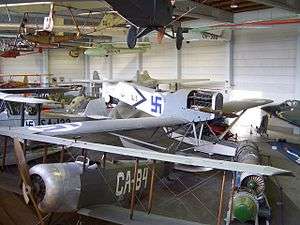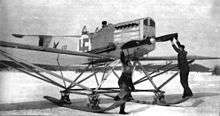IVL A.22 Hansa
IVL A.22 Hansa was a Finnish license copy of the German two-seat, low winged single-engined seaplane Hansa-Brandenburg W.33, which had been designed by Hansa und Brandenburgische Flugzeugwerke in the 1920s.
| A.22 | |
|---|---|
 | |
| Role | Reconnaissance seaplane |
| Manufacturer | IVL |
| First flight | 4 November 1922 |
| Introduction | 1922 |
| Retired | 1936 |
| Primary user | Finnish Air Force |
| Produced | 1922–1925 |
| Number built | 120 |
| Developed from | Hansa-Brandenburg W.33 |
Design and development
The Hansa-Brandenburg W.33 aircraft was designed in 1916 by Ernst Heinkel and entered German service in 1918. Twenty-six aircraft were built of this design, but only six before the collapse of the German empire. Noticeably superior to the FF.33L, it proved to be an excellent aircraft. The Hansa-Brandenburg monoplanes considerably influenced German seaplane design; several copies appeared in 1918, such as the Friedrichshafen FF.63, the Dornier Cs-I, the Junkers J.11, and the L.F.G. Roland ME 8. After the war a version of the W.29 was used by Denmark, while Finland obtained a licence for the manufacture of the W.33.

Operational history
Finland purchased a number of W.33 and W.34 aircraft from Germany. In 1921 Finland also obtained the manufacturing license for the W.33. The first Finnish-built Hansa made its maiden flight on November 4, 1922 and was called A.22. This aircraft was the first industrially manufactured aircraft. During the following four years a total of 120 aircraft were manufactured. This aircraft would become the second most numerous aircraft that had been built in Finland for the Finnish Air Force through the ages (the PIK-20 gliders had been manufactured in greater amounts in the 1970s).
The Finnish Air Force used the aircraft in maritime service until 1936.
Variants
- Hansa-Brandenburg W.33 – German original, 26 built
Survivors
There is one Hansa in the Finnish Aviation Museum.
Specifications (A.22)
Data from Jane's all the World's Aircraft 1928,[1] Valka:IVL A.22 Hansa[2]
General characteristics
- Crew: 2
- Length: 11.1 m (36 ft 5 in)
- Wingspan: 15.85 m (52 ft 0 in)
- Height: 3.37 m (11 ft 1 in)
- Wing area: 44 m2 (470 sq ft)
- Empty weight: 1,470 kg (3,241 lb)
- Gross weight: 2,100 kg (4,630 lb)
- Powerplant: 1 × Fiat A.12bis six-cylinder liquid-cooled in-line engine, 221 kW (296 hp)
- Propellers: 2-bladed fixed pitch propeller
Performance
- Maximum speed: 170 km/h (110 mph, 92 kn)
- Cruise speed: 150 km/h (93 mph, 81 kn)
- Range: 525 km (326 mi, 283 nmi)
- Time to altitude: 3,000 m (9,800 ft) in 22 minutes
- Wing loading: 47.7 kg/m2 (9.8 lb/sq ft)
- Power/mass: 0.1067 kW/kg (0.0649 hp/lb)
Armament
- Guns: 1x machine-gun mounted on a Scarff ring in the rear cockpit
- Bombs: 4x 10 kg (22 lb) bombs
References
| Wikimedia Commons has media related to IVL A.22 Hansa. |
- Grey, C.G., ed. (1928). Jane's all the World's Aircraft 1928. London: Sampson Low, Marston & company, ltd. p. 81c.
- "IVL A.22 Hansa : Finland (FIN)". valka.cz (in Czech and English). Prague. Retrieved 4 March 2018.
Further reading
- Keskinen, Kalevi; Niska, Klaus; Geust, Carl-Fredrik (1981). Suomen museolentokoneet (in Finnish). Espoo: Tietoteos. ISBN 951-9035-60-5.
- Taylor, John W. R.; Alexander, Jean; et al. (1969). Combat aircraft of the world. London: Ebury P.; Michael Joseph. p. 65. ISBN 0-71810-564-8.